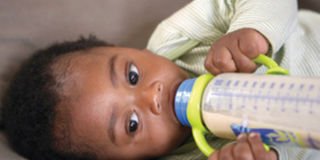How do I ensure I have a healthy bottle-fed baby?

Bottles and all other accessories such as teats, caps, collars, and discs must be sterilised to make sure that they do not harbour harmful bacteria which can grow in the feeding formula and make the baby sick. PHOTO/FILE
What you need to know:
- Normal washing alone is not enough, so it is necessary to sterilise the bottles regularly.
- Do not use hot or boiling water, or run the bottle under hot tap water.
- Use sterile tongs to handle the sterilised bottles and equipment to avoid contaminating them.
Dear Doc,
I have heard of cases where bottle-feeding causes infections in babies. What can I do to ensure that my bottle-fed baby does not become a victim of infections?
Florence
Dear Florence,
Unhygienic feeding bottles can cause infections in babies, so the highest levels of hygiene should be maintained at all times.
Normal washing alone is not enough, so it is necessary to sterilise the bottles regularly.
Bottles and all other accessories such as teats, caps, collars, and discs must be sterilised to make sure that they do not harbour harmful bacteria which can grow in the feeding formula and make the baby sick.
First, wash the bottles and equipment in hot soapy water, then rinse them using clean running water.
You can use a bottle brush to clean the inside of the bottles and clean the teats using a little salt.
Once you have washed them, you can sterilise them either by boiling for about 20 minutes, using steam sterilisation, or using sterilising tablets or liquids.
Use sterile tongs to handle the sterilised bottles and equipment to avoid contaminating them.
Dear Doc,
What is the best way to warm my baby’s bottle?
Rossie
Dear Rossie,
Breast milk is usually ready and always at the right temperature, so no preparation is required.
If you are bottle-feeding your baby, you need to warm the formula to the temperature that the baby is comfortable with.
You can do this by standing the bottle in a bowl of water.
Do not use hot or boiling water, or run the bottle under hot tap water.
These days bottle warmers specifically designed for baby feeding bottles are available.
Never heat a bottle of formula or breast milk using a microwave since a it heats the bottle unevenly, and thus creates hot pockets in the formula which can burn the baby’s mouth.
Spurt a drop of formula on the back of your hand to gauge the temperature; do not use your mouth because you can easily pass bacteria from your mouth to the baby.
Dear Doc,
Can feeding formulas cause constipation in my baby?
Natasha
Dear Natasha,
If you are feeding your baby using an infant formula, it is always advisable to use the amount recommended on the packet.
Do not add extra formula as using too much can make the baby constipated, which can easily lead to dehydration.
If your baby is on formula and has not passed stool for two to three days, consult your doctor about it.
Dear Doc,
Sometimes our two-month old baby vomits after being bottle-fed.
What could be the problem?
Cyrus
Dear Cyrus,
Some babies throw up more milk than others either during or just after being fed.
This is referred to as reflux or regurgitation.
It can be frustrating and you might also make you think that something is wrong with the baby.
Check the hole in the teat of the baby’s bottle to ensure that it is not too big. A big teat can make the baby suckle too quickly, which results in swallowing air; this can make the baby appear sick.
It might be helpful to place the baby in an upright position on your lap after he or she feeds.
Rub the baby’s back to help him or her get rid of the excess air he or she might have swallowed while feeding.
If the baby throws up a lot of milk, he or she might become hungry again rather quickly.
Do not force the baby to take more than their stomach can accommodate during feeding.
Remember that every child is different and that some take only a little milk but require frequent feeding.
However, if the baby vomits often or appears to be in pain, talk to your doctor.
Dear Doc,
Can infant formulas cause allergy in my baby?
If so, what is the alternative?
Lydia
Dear Lydia,
If you suspect that your baby is allergic to an infant formula, it is advisable to talk to your doctor.
The doctor can prescribe a special formula known as hydrolysed protein feed.
These are infant formulas known as hypoallergenic.
However, they are not suitable for babies known to be allergic to cow’s milk.
It is advisable to consult a doctor about hypoallergenic or soya-based formulas before you give them to your baby since there is a possibility of babies who are allergic to cow’s milk also being allergic to soya-based formulas.
Have a question about your health? Send all your questions to [email protected]




